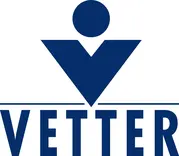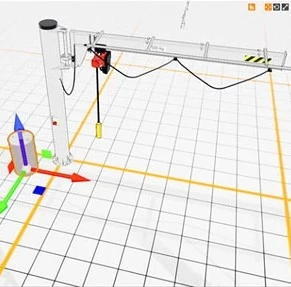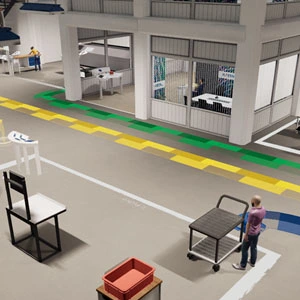Virtual Reality Training Suite
- Easily create virtual reality trainings
- Share them
- No Code
- Realtime 3D
- Everywhere
- Real interaction
- Multiuser
Virtual Reality Training Suite - VIRTS

Simple
Creating virtual reality trainings is simple. Within a few minutes, you can set up a whole 3D Scene
with tasks. You can do simple reviews or complex trainings. Import your CAD models, use 3D models
from asset packs, or create your own.
Create tasks and decide when something should be done. Decide what are tools should be used.
Easily connect the tasks with one click and make trainings without any code.
Proven value
Virtual reality trainings have proven their value already in the past. Creating trainings needed
time and a lot of developers. Now everyone can do this within minutes and share with others
worldwide. Changing trainings you can easily do on your own.
Use this proven technology and train employees or customers with less work and effort than ever before.
Our software is simple so there is no need for any knowledge and it can be used by everyone.


NoCode
Do ergonomics reviews, layout planning, process trainings, or simple games. There is no limitation.
Click on the play button and start your experience as a 3D Desktop or real-time virtual reality. Reach a
huge audience within the shortest time.
Our virtual reality training suite support a wide range of virtual reality headsets as it uses the OPEN
XR standard.
VR glasses should fit your demands perfectly. Our software is supporting this.
Our projects
Create and experience VR Trainings
contact

Benjamin Staiger Founder/COO
Blog
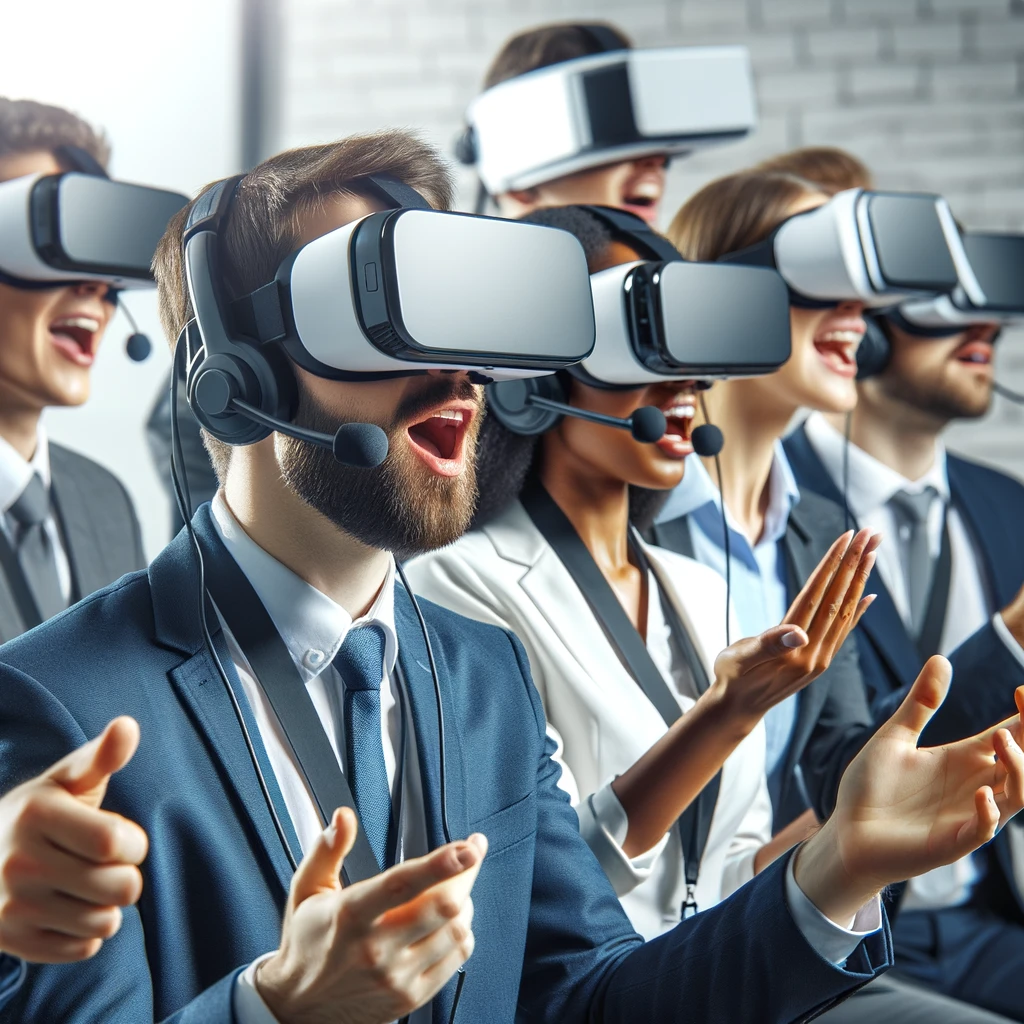
The Evolution of VR Training: Introducing Voice over IP in Our Virtual Reality Training Software Suite
In the realm of learning and professional development, the introduction of Virtual Reality (VR) has heralded a new era. Particularly in the domain of training, VR offers an immersive experience that not only makes learning more effective but also more interactive and engaging. Our Virtual Reality Training Software Suite is at the forefront of this revolution, now introducing a groundbreaking new feature: Voice over IP (VoIP) for real-time communication within the training environment.
Voice over IP: A New Dimension of InteractivityUntil now, VR trainings primarily focused on the visual and interactive component of the learning experience. With the introduction of Voice over IP, we take a step further by enabling users to communicate in real-time while navigating through the virtual environment. This feature extends the capabilities of #virtualreality and #vrtraining with a vital communicative dimension.
The Benefits of the VoIP Feature Enhanced Engagement and CollaborationThe ability for voice communication fosters collaboration and engagement among participants. In scenarios where teamwork and communication are crucial, the VoIP function allows for more natural and effective interaction between participants.
More Realistic Training ScenariosWith Voice over IP, training scenarios can be made more realistic. In environments where verbal communication is an essential part of task completion, such as customer service or emergency management, the integration of voice communication is a valuable enhancement to the training.
Efficient Communication and FeedbackDirect voice communication within the VR training environment allows trainers and participants to give and receive feedback efficiently. This accelerates the learning process and enhances the understanding of complex concepts.
Simplified UsageIntegrating VoIP simplifies the use of the VR training software. Users no longer need to rely on external communication tools or exit the VR environment to speak with each other. This ensures a seamless and immersive learning experience.
Scalability and FlexibilityThe VoIP function opens up new possibilities for the scalability and flexibility of trainings. Large groups can effectively interact within the virtual environment, making the software attractive for businesses of any size.
SummaryThe introduction of Voice over IP in our Virtual Reality Training Software Suite marks a significant advancement in the development of VR training solutions. This feature pushes the boundaries of what is possible in virtual learning environments and sets new standards for interactivity, engagement, and efficiency. The VoIP function underscores our commitment to innovation and our endeavors to offer the most effective and user-friendly training solutions on the market.
With this enhancement, we anticipate that our software will not only revolutionize the way companies train their employees but also set a new benchmark for the integration of technology in learning and development processes.
For more information about our Virtual Reality Training Software Suite and how it can transform your company's training programs, please contact us. We look forward to partnering with you to shape the future of professional development.
Virtual Reality Training: UREALITY at the VR Business Club
On Monday, December 4th, we had the opportunity to showcase our innovative VR training suite from UREALITY at the VR Business Club. This event was all about VR, AR, and 3D solutions, with a focus on service, maintenance, and inspection.
Our solution enables companies to train their service personnel in real-time using Virtual Reality. With our user-friendly 3D authoring system, you can create customized training scenarios without the need for specific programming knowledge. Whether you want to use existing CAD data or create new 3D models, UREALITY offers flexibility and simplicity.
The key features of our VR training suite include:Immersive Realistic Environments: UREALITY creates immersive 3D environments that mimic real-life situations. Service personnel can interact with these scenarios, enhancing their training experience.
No Programming Required: Unlike traditional VR development, UREALITY doesn't require specialized programming skills. This allows companies to create and deploy VR training modules quickly and efficiently.
Hardware Compatibility: UREALITY is designed to work with various VR hardware solutions, making it adaptable to different setups, whether you have VR headsets or just a web browser.
Integration of CAD Data: Companies can leverage their existing CAD data to build VR training modules, streamlining the content creation process.
Cost Savings and Environmental Benefits: By using UREALITY, companies can conduct training and inspections without the need for costly travel, reducing both expenses and carbon emissions. This aligns with the growing focus on sustainability and cost-effectiveness in today's business landscape.
Our presentation at the VR Business Club provided an opportunity to showcase the diverse applications of UREALITY and share concrete customer examples. We are delighted that our solution has generated significant interest and are proud to contribute to the transformation of training and collaboration methods in businesses.
We would like to express our sincere gratitude to the VR Business Club for this opportunity and look forward to further exciting developments in the world of Virtual Reality.
For more information about UREALITY and the possibilities of VR training, please feel free to contact us.
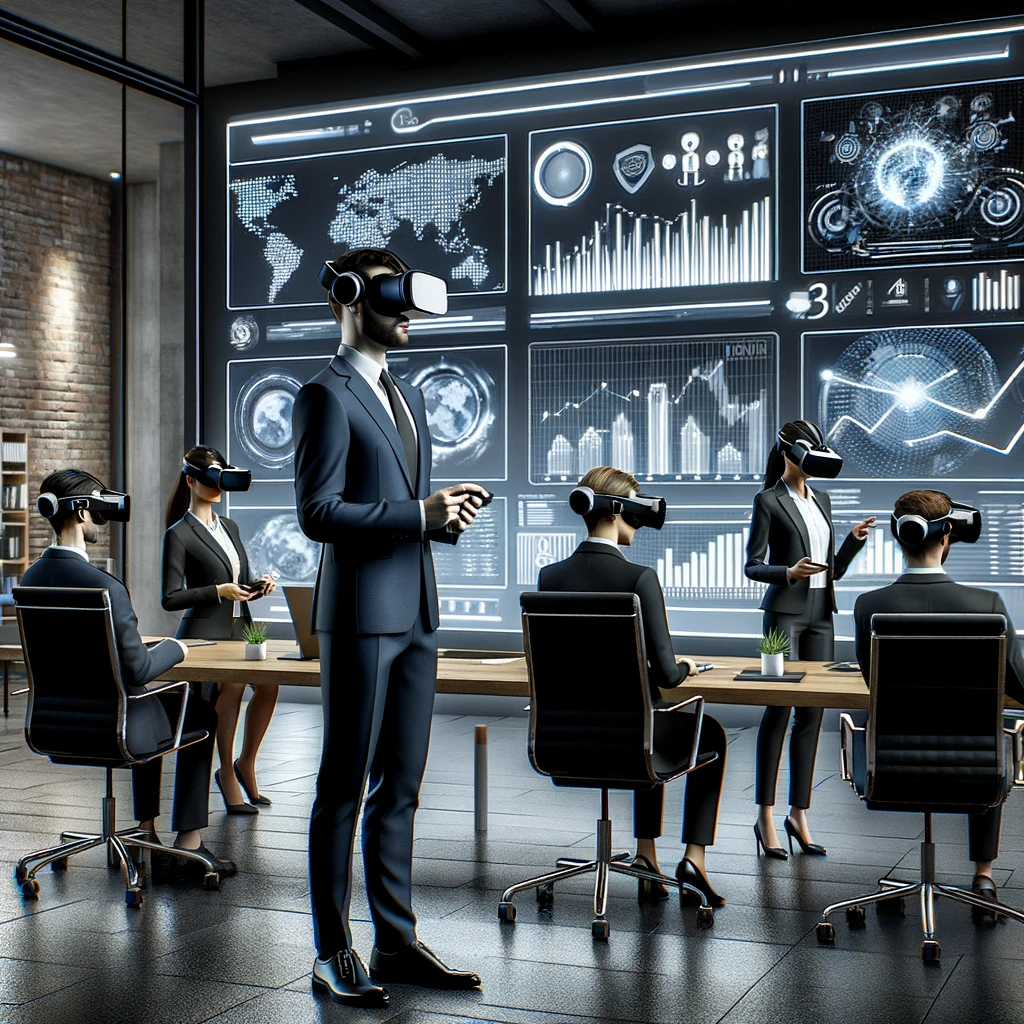
Revolutionizing Training with Virtual Reality: Introducing Realistic Human Avatars
In today's fast-paced world, traditional methods of training are becoming obsolete. With rapid advancements in technology, there is a growing need for more effective and interactive learning methods. This is where Virtual Reality (VR) steps in. The latest addition to our software now allows the incorporation of highly realistic human avatars into the virtual environment, vastly expanding the possibilities of Virtual Reality training.
Our software has added the feature of bringing human avatars into the Virtual Reality environment. These avatars are pre-animated and can communicate and interact with users in real-time through audio sequences. This enhances the level of realism and makes the training more immersive.
Thanks to this feature, it is now possible to create realistic scenarios that make training more effective. Whether it's medical simulations, technical training, or customer service training, the possibilities are endless.
The avatars can be tailored to meet specific user needs. They can engage in specific dialogues, answer questions, and assign tasks, leading to a personalized learning experience.
Utilizing VR technology for training not only reduces the time required for training but also its associated costs. It eliminates the need for physical resources and broadens the reach to a wider audience.
Incorporating realistic human avatars into Virtual Reality training is a significant leap forward. This new feature of our software opens up a myriad of possibilities for effective and interactive real-time training that is both cost-effective and highly personalized.
For more information, we recommend experiencing a demo of our software to explore the possibilities firsthand.

The Hannover Messe - An Overview
The Hannover Messe is undoubtedly one of the largest industrial trade fairs worldwide, serving as an outstanding platform for companies to showcase their latest products and innovations to an international audience. This year, Virtual Reality Training took center stage at the fair and garnered the attention of industry experts, entrepreneurs, and even high-ranking government officials.
The booth presenting Virtual Reality Training software attracted numerous fair attendees who were curious to experience the possibilities of this emerging technology firsthand. The VR Training software provided an immersive and interactive experience that enthralled visitors and demonstrated how it can be used in their businesses or educational institutions.
One of the highlights of the fair was undoubtedly the visit of Ms. Bettina Stark-Watzinger, the Minister of Education. Her interest in Virtual Reality Training software underscored the pivotal role of this technology in the field of education and the associated opportunities. She took the time to tour the booth and engage with the developers of the software to discuss its potential impact on education.
The software received not only positive feedback from fair attendees but also acclaim from experts in the field of Virtual Reality. They praised the innovative approach and practical applicability of this software, especially for training and educating employees and students. This praise reaffirmed the value and relevance of Virtual Reality Training software.
The fair appearance was a great success and vividly demonstrated how Virtual Reality technology can revolutionize the way training and further education are conducted. Companies and educational institutions can conduct training at various locations using this technology, saving time and costs. Furthermore, VR technology can reduce training duration and enhance the effectiveness of training measures.
The Scientific Benefits of VR Training
Benjamin Staiger of Ureality opened his keynote speech on March 7, 2023, at the regional Innovation and Transfer Center with the words: "There has never been a more opportune time than now to bring training into virtual reality." In his speech, he emphasized the scientifically proven benefits of Virtual Reality Training and placed particular emphasis on the practical value of this technology.
The history of Virtual Reality dates back to the 1960s, and more than 1.6 million scientific publications have already confirmed the benefits of training in virtual reality. This means that decisions no longer have to rely on intuition; the value of Virtual Reality Training compared to conventional training is scientifically substantiated.
In addition to scientific evidence, the practical application of training in virtual reality was highlighted. Over the past decade, the technology has significantly evolved, creating optimal conditions for VR Training in practice. The hardware has become lighter, more powerful, and cost-effective, and the systems are designed to be user-friendly.
Virtual Reality Training is no longer limited to large corporations, as many tools facilitate its integration into medium-sized companies. Integration into the corporate structure, coverage of topics such as rights and roles, and the definition of training content have become easier and more cost-effective thanks to smarter software. The integration of CAD data is straightforward, and 3D data is readily available on major platforms. Creating Virtual Reality Training no longer requires programming skills, as authoring tools like Ureality's 3D VR Creator enable the creation and execution of VR training.
Employees also show high acceptance for training in virtual reality, especially in the context of change management. However, successful implementation requires a clear concept and an understanding of internal processes. Clear goals and the measurability of successes are crucial for selecting the right technology, whether hardware or software, and recognizing the return on investment.
Everything points to the right time to introduce Virtual Reality Training in companies. Both scientific insights and practical experience are abundant. The technology is affordable and stable, and employees show unparalleled acceptance. An optimal starting point is a pilot project with clear goals, and Ureality provides support to its customers from idea to implementation.

Our academic work
Weigel, A., Baumgart, T. L., Sauter, L., & Niehaves, B. (2023) Ready Designer One: Exploring Expected Conditions for Interrupting Design Work by Virtual Reality. In Proceedings of the 31st European Conference on Information Systems (ECIS), Kristiansand, Norway.
Sauter, L., Weigel, A., & Ludwig, T. ( 2023) It’s Tool Time: Exploring Tool Design Alternatives for Virtual Reality Trainings. In Proceedings of the 31st European Conference on Information Systems (ECIS), Kristiansand, Norway.
Zeuge, A., Schaefer, C., Weigel, A., Eckhardt, A., & Niehaves, B. (2023). Crisis-driven digital transformation as a trigger for process virtualization: Fulfilling knowledge work process requirements for remote work. International Journal of Information Management, 70, 102636.
Weigel, A., Baumgart, T. L., Heinlein, M., Huchler, N., Niehaves, B., Sauter, L., Schmallenbach, A., Staiger, B., & Wittal, R. (2022). Arbeitsgestaltung durch Kompetenzvermittlung in VR. In: Nitsch, V., Brandl, C., Häußling, R., Roth, P., Gries, T., Schmenk, B. (eds) Digitalisierung der Arbeitswelt im Mittelstand 2. Springer Vieweg, Berlin, Heidelberg. https://doi.org/10.1007/978-3-662-65858-1_6
Weigel, A., Baumgart, T. L., Zeuge, A., Sauter, L., Niehaves, B., Huchler, N., Heinlein, M., Wittal, R., & Staiger, B. (2022). Competence Transfer in Virtual Realities (VR): Can VR Bring Products and Services Together? WORK – A Journal of Prevention, Assessment & Rehabilitation, 72(4), 1727–1743. doi: 10.3233/WOR-211244
Weigel, A. & Sauter, L. (2022). Crane Assembly and Service Processes meet Virtual Reality. In: Katterfeld, A., Richter, K., Krause, F., Pfeiffer, D. (Hrgs.) 30. Internationale Kranfachtagung 2022 „Kran 4.0 – Erfolge der Digitalisierung“. Universitätsbibliothek Magdeburg, S. 189-202. doi: 10.25673/38810
Zeuge, A., Weigel, A., Sch aefer, C., & Niehaves, B. (2022). The New Normal of Virtual Team Cohesion – a Qualitative Study to Investigate the Impact of COVID-19. 28th Americas Conference on Information Systems (AMCIS) Proceedings, Minneapolis. August 10-14, 2022
Huchler, N., Wittal, R., & Heinlein, M. (2022). Erfahrungsbasiertes Lernen in der virtuellen Realität–Potenziale und Herausforderungen. Digital Lernen (BWP 2/2022)
Weigel, A.; Zeuge, A.; Baumgart, T.; & Niehaves, B. (2021). Bittersweet Virtual Reality Collaboration: Necessary and Sufficient Conditions. 42nd International on Information Systems (ICIS) Proceedings, An Online AIS Conference. December 12-15, 2021
Heinlein, M., Huchler, N., Wittal, R., Weigel, A., Baumgart, T., & Niehaves, B. (2021). Erfahrungsgeleitete Gestaltung von VR-Umgebungen zur arbeitsintegrierten Kompetenzentwicklung: Ein Umsetzungsbeispiel bei Montage-und Wartungstätigkeiten. Zeitschrift für Arbeitswissenschaft.75, 388–404. ISSN: 2366-4681. https://doi.org/10.1007/s41449-021-00283-6
Zeuge, A., Schaefer, C., Weigel, A., Niehaves, B. (2021). Happy Together – How can Virtual Leaders Foster Team Cohesion? 27th Americas Conference on Information Systems (AMCIS) Proceedings, An Online AIS Conference. August 9-13, 2021
Weigel, A., Sauter, L., and Niehaves, B. (2021), More than you know – An Investigation of VR to Support Tacit Knowledge Transfer within Organisations. Pacific Asia Conference on Information Systems (PACIS) Proceedings, An Online AIS Conference. July 12-14, 2021
Weigel, A.; Zeuge, A.; and Sauter, L. (2021), Influencers of Digital Transformation: A New Concept of User Participation in IS Projects. In Proceedings of the 29th European Conference on Information Systems (ECIS), An Online AIS Conference, June 14-16, 2021
Zeuge, A., Oschinsky, F., Weigel, A., Schlechtinger, M., & Niehaves, B. (2020), Leading Virtual Teams–A Literature Review. In Proceedings of the New Future of Work Symposium, August 3-5, 2020
Weigel, A., Hoffmann, J., & Klesel, M. (2020), Can Virtual Realities reduce the Gap between Organizations? Insights from a Case Study on the Potential of VR-Supported Perspective Taking. In Proceedings of the 28th European Conference on Information Systems (ECIS), An Online AIS Conference, June 15-17, 2020
Weigel, A., Heger, O., Hoffmann, J., & Röding, K. (2020), CEOs of SMEs: How IT-Governance compensates the Lack of Digital Competencies. In Proceedings of the 28th European Conference on Information Systems (ECIS), An Online AIS Conference, June 15-17, 2020
Klesel, M., Schlechtinger, M., Oschinsky, F. M., Conrad, C., Niehaves, B. (2020), Detecting Mind Wandering Episodes in Virtual Realities Using Eye Tracking. In NeuroIS Retreat 2020, June 2-4, 2020
Schlechtinger, M. (2020), What Are You Looking At? Using Eye Tracking to improve Learning in Virtual Environments. In New Perspectives on Digitalization: Local Issues and Global Impact, April 24, 2020
Weigel, A. (2020), A Design Journey: Towards a Virtual Reality Simulation and Training Application. In New Perspectives on Digitalization: Local Issues and Global Impact, April 24, 2020 – Most Practice-Oriented Paper Award
André, E.; Aurich, J.; Bauer, W.; Bullinger-Hoffmann, A.; Heister, M.; Huchler, N.; Neuburger, R.; Peissner, M.; Stich, A.; Suchy, O.; Ramin, P.; Wächter & M. (2020), Kompetenzentwicklung für Künstliche Intelligenz – Veränderungen, Bedarfe und Handlungsoptionen. Whitepaper aus der Plattform Lernende Systeme, München

